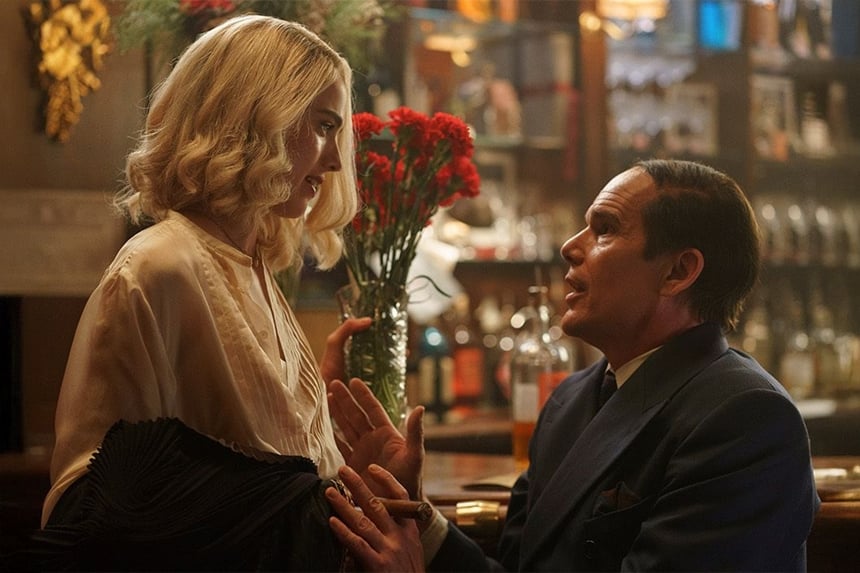
Blue Moon
⭐️ ⭐️ ⭐️ ⭐️
Rating: R
Run Time: 1 hour 40 minutes
Stars: Ethan Hawke, Margaret Qualley, Bobby Cannavale, Andrew Scott
Writer: Robert Kaplow
Director: Richard Linklater
Reviewed at the Toronto International Film Festival
No one does “two people talking” better than director Richard Linklater — from 2001’s Tape to Before Sunrise and its sequels (all costarring Ethan Hawke), he demonstrates again and again the unlikely cinematic power of a couple of folks verbally dueling, flirting, accusing, apologizing, reconciling.
Technically, there are a lot more than two characters in Blue Moon, but the central figure, Broadway lyricist Lorenz Hart (again, played by Hawke), takes them all on, one at a time.
It is the 1942 opening night of Oklahoma!, the ground-breaking musical co-written by Richard Rodgers and Oscar Hammerstein II, and it’s the pair’s first collaboration. For nearly 25 years, Rodgers had worked exclusively with Hart, penning hit shows that spawned classic songs like “Where or When,” “My Funny Valentine,” “Bewitched, Bothered and Bewildered,” and, of course, “Blue Moon.”
But Oklahoma! is different. Everyone in town knows this is the musical that will change everything — and everyone also knows this marks the effective end of the Rogers and Hart partnership.
No one is more acutely aware of this than Hart. At the opening night afterparty, roaming the plush confines of Sardi’s restaurant, becoming increasingly drunk, Hawke’s Hart buttonholes his convivial bartender (Bobby Cannavale), the writer E.B. White (Patrick Kennedy), his longtime collaborator, Rodgers (Andrew Scott), and, most significantly, the much-younger Elizabeth Weiland (Margaret Qualley), with whom he is hopelessly infatuated. Along the way he fishes for compliments, doles out sly insults, and shamelessly sucks up to the Broadway luminaries who hold his future in their hands.
Screenwriter Robert Kaplow — who wrote Linklater’s 2008 film Me and Orson Welles, but also just recently retired as an English teacher at a New Jersey high school — has fashioned a script that strips bare the tortured psyche of a guy who was a) adored by friends and deeply respected by his rivals and b) crippled by insecurities that led to blinding drinking bouts and his death, at age 48.
Gamely sporting the world’s worst comb-over, breathing rings of cigar smoke, wearing a face that transparently evokes pride, hope, desperation and love sickness, Hawke gives the performance of his career. Hart was just five feet tall; Hawke is considerably taller, and while watching the film you may spend an inordinate amount of time trying to game out just how Linklater accomplishes the illusion (I’m guessing a raised set with Hawke walking along a lower floor level). Beyond that, the actor seems to have found a way to physically contract himself, drawing his shoulders closer together; retracting his arms as if they were tubular accordion bellows.
But there’s nothing contracted about Hawke’s performance. Tiny as his Lorenz Hart may be, Hawke fills the screen, even in long shots, with his bombastic presence. It’s been reported that Hawke and Linklater had been wanting to make this movie for nearly a decade, but did not pull the trigger until they both felt Hawke was old enough (he’s now in his mid-50s, seven or eight years older than hard-living Hart was at his death).
Surrounding Hawke is a company of first-rate actors, each charged with drawing out a facet of the complicated man at the film’s center. The bartender highlights Hart’s long, doomed struggle with alcohol and the brash, common touch that flavored so many of his songs. Cozying up with E.B. White, Hart engages in wordplay of the highest order, reflecting on the dark arts of internal rhyme and always conjuring up the just-right word. Playing name-that-song with a piano-playing soldier (Jonah Lees), Hart tests his own musical immortality.
You would think Hart’s most painful encounter of the evening would be in a stairwell with his old partner, Richard Rodgers (played with beautiful, patient understatement by Andrew Scott, TV’s Ripley). But Rodgers, reluctantly moving on due largely to alcoholic Hart’s unreliability, takes pains to genuinely express his lifelong gratitude — and even extends an offer to collaborate on a handful of songs for an upcoming revival of their old show A Connecticut Yankee. It would be the last project Hart ever completed.
But the most heartbreaking conversation of the evening, the one that draws the curtain on Hart’s bittersweet night, is a quiet sit-down in the cloak room with his self-described protégé, Elizabeth, portrayed with regal informality by Qualley (the script is based largely on unpublished letters between the two). Willowy and whip-smart, Elizabeth is everything Hart — whose sexuality appears to have been somewhat fungible — could want in a lover. Elizabeth, as warmly and tenderly as she can, admits she adores Hart — and then come the dreaded words: “Just not in that way.”
His countenance melting like a candle filmed in stop-motion, Hawke’s Hart sinks into the recognition that he has, of course, been right about himself all along: He’s too unattractive to be lovable, too intellectual to be engaging, maybe even too egotistical to ever truly be in love.
As the crowd files out of Sardi’s, heading for another party to celebrate the success of Oklahoma!, Hart flits from person to person, reminding them that he, too, is having a party that night, at his place, with a band and dancing.
“Everyone will be there,” he promises.
But they know, he knows, and we know Lorenz Hart is heading home alone.
Become a Saturday Evening Post member and enjoy unlimited access.
Subscribe now
Source link

